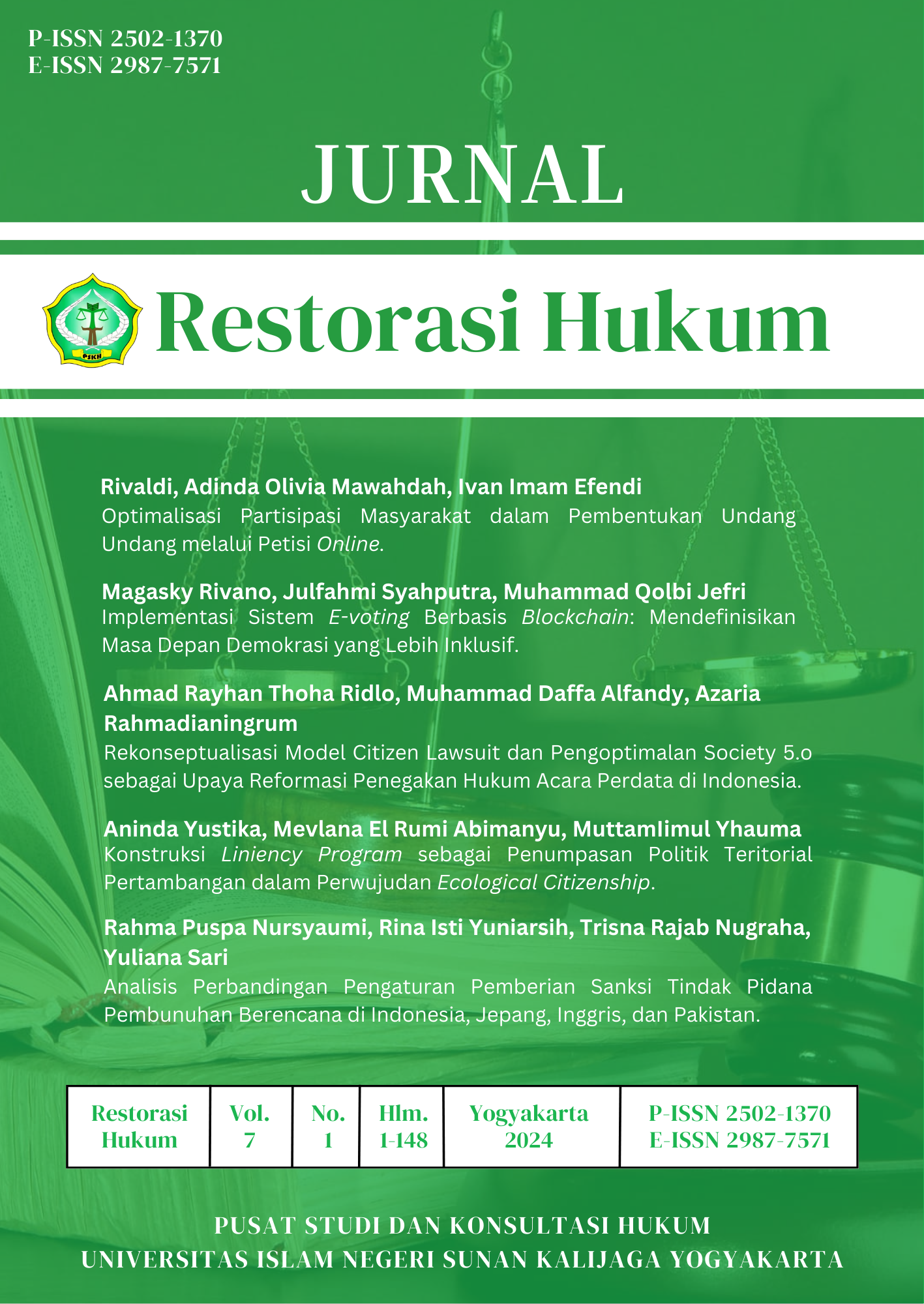Rekonseptualisasi Model Citizen Lawsuit dan Pengoptimalan Society 5.0 Sebagai Upaya Reformasi Penegakan Hukum Acara Perdata di Indonesia
DOI:
https://doi.org/10.14421/jrh.v7i1.3536Keywords:
Society 5.0 Era, Citizen Lawsuit Reconceptualization, Civil Procedure Law Enforcement Reform, Petition System, Notification Stage.Abstract
Abstract: The presence of the citizen lawsuit model in civil procedural law enforcement is one example that the law is dynamic following the development of human direction and mindset. Citizen lawsuit is defined as a model lawsuit that was born and known in a country with a common law legal system where citizens on behalf of the public interest are given space to file a lawsuit against unlawful acts committed by state administrators. However, countries that adopt the civil law legal system also implement it, such as the Netherlands which is known as actio popularis and Indonesia. The problem is, the implementation of this lawsuit model has not been regulated at all by national law, causing the practice of citizen lawsuits that have not been uniform, but have a disparity pattern (not uniform). In this paper, the author reconceptualizes the citizen lawsuit model as an effort to create integrated and systematic civil procedural law enforcement. The reconceptualization of the citizen lawsuit model consists of 4 (four) stages, namely the petition system stage, the notification stage, the administrative stage, and the judicial stage.
Abstrak: Kehadiran model citizen lawsuit dalam penegakan hukum acara perdata merupakan salah satu contoh bahwasannya hukum bersifat dinamis mengikuti perkembangan arah serta pola pikir manusia. Citizen lawsuit didefinisikan sebagai suatu model gugatan yang lahir dan dikenal dalam negara dengan sistem hukum common law dimana warga negara atas nama kepentingan umum diberi ruang untuk mengajukan gugatan terhadap perbuatan melawan hukum yang dilakukan oleh penyelenggara negara. Namun, negara-negara yang menganut sistem hukum civil law pun turut melaksanakannya, seperti Belanda yang dikenal dengan istilah actio popularis dan Indonesia. Permasalahannya, pelaksanaan model gugatan ini belum diatur sama sekali oleh hukum nasional sehingga menimbulkan praktik citizen lawsuit yang belum bercorak uniformitas (seragam), melainkan bercorak disparitas (tidak seragam). Dalam tulisan ini, Penulis merekonseptualisasikan model citizen lawsuit sebagai upaya menciptakan penegakan hukum acara perdata yang terintegrasi dan sistematis. Rekonseptualisasi model citizen lawsuit terdiri atas 4 (empat) tahapan, yaitu tahap sistem petisi, tahap notifikasi, tahap administrasi, dan tahap yudisial.Downloads
References
Evi Sundari. 2002. Pengajuan Gugatan secara Class Action (Suatu Studi Perbandingan dan Penerapannya di Indonesia). Yogyakarta: Universitas Atma Jaya Press.
Fauzi, Aditya Ahmad. 2023. Pemanfaatan Teknologi Informasi di Berbagai Sektor Pada Masa Society 5.0. Jambi: PT. Sonpedia Publishing Indonesia.
Johnny Ibrahim. 2007. Teori & Metodologi Penelitian Hukum Normatif. Malang: Bayumedia Publishing.
Peter Mahmud Marzuki. Penelitian Hukum: Edisi Revisi. Jakarta: Kencana, 2017.
M Nazir. 2005. Metode Penelitian. Jakarta: Ghalia Indonesia.
Muhammad Chairul Huda. 2021. Metode Penelitian Hukum (Pendekatan Yuridis Sosiologis). Semarang: The Mahfud Ridwan Institute.
Munir Fuadi. 2005. Perbuatan Melawan Hukum (Pendekatan Kontemporer). Bandung: Citra Aditya Bakti.
R. Setiawan. 2000. Pokok-Pokok Hukum Perikatan, Mojokerto: Bina Cipta Abadi.
Wirjono Prodjodikoro. 2000. Perbuatan Melanggar Hukum Dipandang dari Sudut Hukum Perdata. Bandung: CV. Mandar Maju.
Yahya Harahap. 2017. Hukum Acara Perdata. Jakarta: Sinar Grafika.
Yulia. 2018. Hukum Acara Perdata. Aceh: Universitas Malikussaleh Press.
Adelman and Glicksman 2020, ‘Reevaluating Citizen Suits in Theory and Practice’, University of Colorado Law Review 91.
Affan Akbar, et.al 2023, ‘Perkembangan Demokrasi di Indonesia’, ADVANCES in Social Humanities Research, Vol. 1, No. 5, hlm. 627-635.
Charles N. Nauen 1989, ‘Citizen Environmental Lawsuits After Gwaltney: The Thrill of Victory or The Agony of Defeat?’, William Mitchell Law Review, Vol. 15, Rev. 327, hlm. 329.
Faradina Naviah 2013, ‘Penerapan Mekanisme Gugatan Citizen Lawsuit dalam Hukum Acara Perdata di Indonesia’, Jurnal Verstek, Vol. 1, No. 3, hlm. 1-12
Abdul Fatah, 2013, ‘Gugatan Warga Negara sebagai Mekanisme Pemenuhan Hak Asasi Manusia dan Hak Konstitusional Warga Negara’, Jurnal Yuridika, Vol. 28, No. 3, hlm. 293-303
Jonathan S. Campbell 2000, ‘Has the Citizen Suit Provision of the Clean Water Act Exceeds its Supplemental Birth?’, William & Mary Environmental Law and Policy Review, Vol. 24, Issue 2, hlm. 306.
Lista Laras Nur Medina 2021, ‘Perbandingan Penyelesaian Sengketa Lingkungan Hidup melalui Mekanisme Gugatan Warga Negara (Citizen Lawsuit) di Indonesia dan Amerika Serikat’, SIMBUR CAHAYA : Jurnal Ilmiah Ilmu Hukum, Vol. 28, No. 2, hlm. 245-264.
Nafiah, 2013, “Penerapan Mekanisme Gugatan Citizen Lawsuit dalam Hukum Acara Perdata di Indonesia”, Jurnal Verstek, Vol. 1, No. 1, hlm. 6.
Otong Syuhada 2021, ‘Karakteristik Negara Hukum Pancasila yang Membahagiakan Rakyatnya’, Jurnal Presumption of Law: Fakultas Hukum Universitas Majalengka, Vol. 3, No. 1, 2021, hlm. 1-18.
Paris Hendra Wijaya Sinaga, et.al, 2022, ‘Social control of government policy through the citizen lawsuit mechanism, Jurnal Cakrawala Hukum, Vol. 13, No.2, hlm 128-134
Taufiqurrohman dan Priambudi 2021, ‘Mengatur Petisi di dalam Peraturan Perundang-Undangan: Upaya Penguatan Posisi Masyarakat terhadap Negara dalam Kerangka Perlindungan Kebebasan Berpendapat’, Jurnal Legislasi Indonesia, Vol. 18, No. 1.
Zidny Ilman 2023, “Perlindungan Hak Warga Negara Terhadap Kelalaian Pemerintah Melalui Gugatan Citizen Lawsuit”, Jurnal Mahasiswa Indonesia, Vol. 1, No.1, hlm. 1-15
Downloads
Published
Issue
Section
License
Copyright (c) 2024 Ahmad Rayhan Thoha Ridlo, Muhammad Daffa Alfandy, Azaria Rahmadianingrum

This work is licensed under a Creative Commons Attribution-ShareAlike 4.0 International License.
Authors who publish with this journal agree to the following terms:
- Authors retain copyright and grant the journal right of first publication with the work simultaneously licensed under a Creative Commons Attribution-ShareAlike 4.0 International (CC BY-SA 4.0) that allows others to share the work with an acknowledgment of the work's authorship and initial publication in this journal.
- Authors are able to enter into separate, additional contractual arrangements for the non-exclusive distribution of the journal's published version of the work (e.g., post it to an institutional repository or publish it in a book), with an acknowledgment of its initial publication, i.e. this journal.
- Authors also grant any third party the right to use the article freely as long as its integrity is maintained and its original authors, citation details, and publisher are identified.




